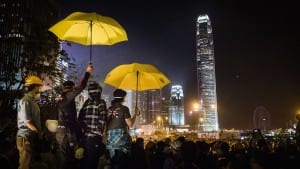One Country, Two Systems: an unfinished experiment?
By Thomas Hughes, on 12 February 2016
In this lecture by the former Dean of Law of the University of Hong Kong, Professor Johannes Chan, we were taken on a whistle-stop tour of the history of the legal and political confrontations between Hong Kong and the mainland government of the People’s Republic of China (PRC).

Protesters during the Umbrella Movement. By Pasu Au Yeung via Wikimedia Commons
Most people’s recent images of Hong Kong are dominated by the “Umbrella Movement” of 2014. The mostly student protestors were pushing for the Standing Committee of the National People’s Congress (NPCSC) in mainland China to allow a free selection of candidates for the Hong Kong Chief Executive and Legislative council.
This was the culmination of increasing tensions between the two regions as they have spent the 20 years since Hong Kong was returned to China testing the boundaries of their relationship.
Since the protests, the NPCSC has been looking to exercise greater control over Hong Kong. Publishers and journalists have disappeared and academia has been interfered with. So what has gone wrong in this relationship?
 Close
Close




